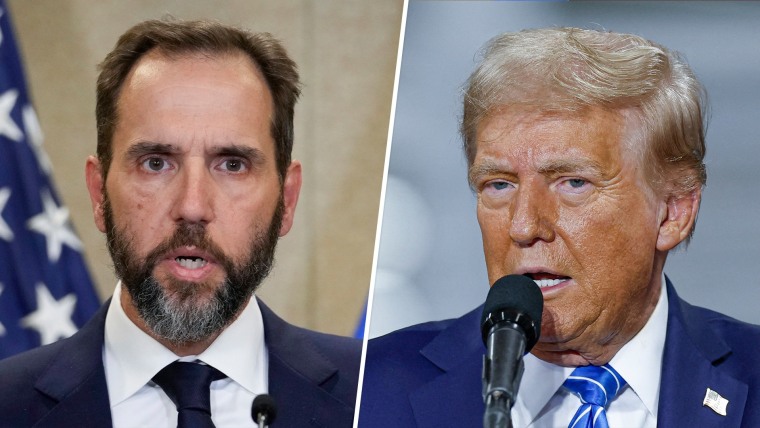WASHINGTON — Former President Donald Trump and his campaign have accused special counsel Jack Smith of violating long-standing Justice Department norms by including new revelations about his efforts to overturn his 2020 election loss in a filing released Wednesday.
In reality, a federal judge, not Smith, made the decision to release the filing to the public.
Trump on Thursday called it a "weaponization of government" to release the filing just a month before Election Day, alleging that Smith and federal law enforcement officials were improperly influencing a presidential election.
It's true that the Justice Department typically abides by an informal 60-day “quiet period” before an election — meaning it avoids taking discretionary action that could be seen as influencing voters. The new disclosures from the special counsel's office, however, were made in an ongoing criminal case at the order of a federal judge, Tanya Chutkan, who ultimately made the decision to release the redacted filing Wednesday.
Smith wasn’t aware that Chutkan was going to make the decision to release the document nor when, two sources familiar with the matter who were not authorized to speak publicly said.
Others have compared the “October surprise” filing to the then-FBI director James Comey’s pronouncements about Hillary Clinton’s emails in October 2016, to Trump’s benefit. But the scenarios are starkly different. In 2016, the director of the FBI made disparaging comments about a presidential candidate who, its investigation found, didn't commit conduct that warranted criminal charges. In 2024, a special counsel who secured three separate indictments from different federal grand juries against a former president disclosed information in an ongoing criminal case at the order of a federal judge.Chutkan has repeatedly made it clear in court hearings that Trump’s presidential run and campaign schedule — despite the Trump team’s protests — will have no impact on the criminal case before her. She made that point explicitly in an order last month, writing that Trump’s “concern with the political consequences of these proceedings does not bear on the pretrial schedule.”
Chutkan, who regained control of the case in August after the Supreme Court ruled that Trump has immunity for some official acts relevant to the case, had ordered Smith's and Trump's teams to submit their arguments about what Trump conduct in the case was presidential and what was private.
Smith's team elected to clear the plate, getting a brand-new grand jury to return a fresh indictment without hearing testimony about Trump's official acts, meaning mostly testimony about his attempts to weaponize the Justice Department for his personal benefit. The new indictment, handed up in late August, was returned just outside the window of the so-called 60-day rule, a guideline based on "long-standing Justice Department policies and tradition" that recommends federal prosecutors take no action against a candidate in the period immediately before an election.
Even with the new indictment, there were still a lot of details to work out to determine the bounds of the case: what evidence is in, what evidence is out. The Supreme Court’s opinion left it up to Chutkan to make many of the fact-specific immunity determinations, and written arguments were always going to be part of the process.
Chutkan set a deadline of Sept. 26 for Smith to file his opening brief on immunity, and because the brief and its appendix included "sensitive material," such as grand jury and witness information, Smith had to file his brief under seal, which his office did last week.
After she heard opposition from Trump's team about the redactions Smith's team suggested, Chutkan reviewed the brief and ultimately decided that the redactions were appropriate. Chutkan also responded to Trump's earlier complaints about potentially violating the 60-day rule, writing on Sept. 24 that his team could now explain "how this court is bound by or has jurisdiction to enforce Department of Justice policy."
Trump argued on his Truth Social account Thursday that the Justice Department should do “absolutely nothing” that could interfere with an election in the 60 days before it. "They disobeyed their own rule in favor of complete and total election interference," he wrote in one post. "I did nothing wrong, they did! The case is a scam, just like all of the others."
The 60-day period doesn't apply to judges, nor does it generally apply to pending cases, although that's always subject to discretion if prosecutors want to avoid taking certain actions even in pending cases. Chuck Rosenberg, a Justice Department veteran and NBC News legal analyst, said Smith's team was doing things by the book.
“The case was previously indicted. Litigating that case is an obligation of the Smith team and not a violation of Justice Department guidelines," Rosenberg said. "In any event, the Smith team properly sealed its filing. The judge properly unsealed it. It’s really not any more complicated than that.”
Still, Smith's decision to swiftly seek a superseding indictment in August can't be separated from the reality that he and his team believe Trump is a criminal who committed four felonies in a conspiracy to overturn the 2020 election, that he is a repeat offender who the committed the kind of criminal conduct that would earn him a lengthier sentence and that he should be serving that sentence in 2025, not in the White House. Had Smith's team had its way, the Supreme Court wouldn't have stepped in, and Trump would currently be in federal prison or, at least, a convicted criminal, and it would be preparing its sentencing memos for Chutkan as Election Day nears.
Trump’s campaign rhetoric about the Justice Department, going back to his time in office, has also deeply offended federal prosecutors to their core, undermining the institution and principles they've dedicated their careers to.
Trump's attacks on the Justice Department are similar to those prosecutors have highlighted in the more than 1,500 criminal cases against Jan. 6 defendants, the kinds of comments that federal prosecutors have argued show a lack of remorse and disrespect for the law and therefore warrant longer sentences.


